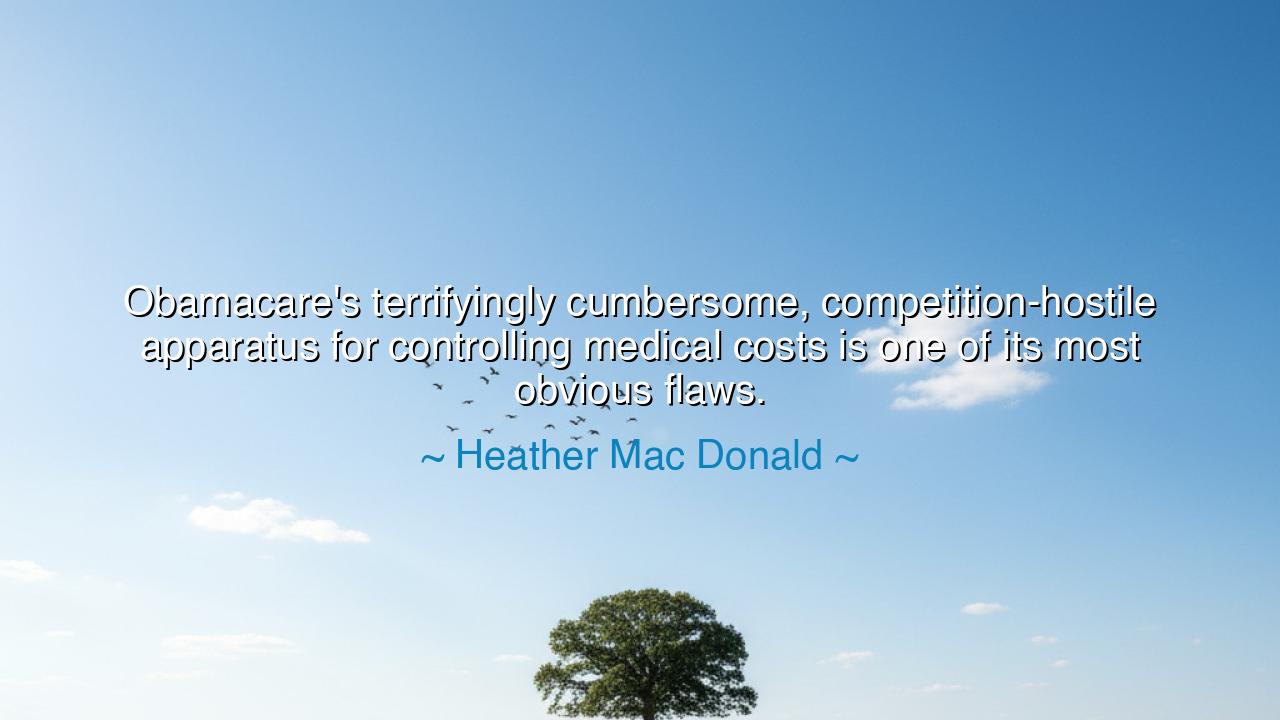
Obamacare's terrifyingly cumbersome, competition-hostile
Obamacare's terrifyingly cumbersome, competition-hostile apparatus for controlling medical costs is one of its most obvious flaws.






“Obamacare’s terrifyingly cumbersome, competition-hostile apparatus for controlling medical costs is one of its most obvious flaws.”
Thus declared Heather Mac Donald, thinker and critic, who gazes not with malice but with warning upon the machinery of modern governance. Her words are sharp as the sword of an ancient prophet, cutting through the fog of policy to reveal a deeper truth—that systems built without regard for freedom and efficiency, no matter how noble their purpose, risk becoming burdens too heavy for the very people they seek to heal. In this quote lies the tension that has haunted civilizations since the dawn of the state: the balance between compassion and control, between the heart that desires justice and the hand that enforces it.
When Mac Donald speaks of a “terrifyingly cumbersome apparatus,” she does not speak only of documents and decrees, but of the weight of bureaucracy itself—the invisible empire of forms, permissions, and middlemen that grows wherever good intentions are not tempered by wisdom. In her critique of Obamacare, formally the Affordable Care Act, she laments that what began as a promise of care for all became a labyrinth of regulation, where physicians must navigate endless rules and competition is smothered beneath government oversight. She warns that a system too centralized, though meant to create order, can instead crush innovation, discourage excellence, and rob individuals of the power to choose their own path to healing.
This truth, though dressed in modern garb, is ancient as empire. The philosopher Tacitus once wrote, “The more corrupt the state, the more numerous the laws.” For even the Romans, masters of governance, understood that excessive control breeds inefficiency, and inefficiency breeds decay. The more the state sought to manage every detail of life, the less vigor remained in the hearts of its citizens. So too, Mac Donald fears, with the sprawling structures of modern healthcare—where the physician’s wisdom yields to the administrator’s checklist, and the patient becomes a number in a ledger rather than a soul in need.
Yet within her words lies not contempt for compassion, but a call for balance. She does not reject the aim of healing the poor, but challenges the means by which it is done. She asks: can generosity thrive in a system that punishes competition? Can innovation blossom where regulation stifles risk? In the ancient world, the Greeks taught that virtue lies in the golden mean—between excess and deficiency. Likewise, a society must find balance between the hand that helps and the hand that holds too tightly. To ensure care without crushing freedom is the art of true governance.
Consider the parable of Dr. Ignaz Semmelweis, the 19th-century physician who discovered that handwashing could save lives. His discovery came not from government mandate but from independent observation and courage. Yet in his time, institutions rejected his findings, clinging to established procedures rather than embracing new insight. The tragedy of Semmelweis reminds us that when systems grow too rigid, they resist change even when lives depend on it. So, too, does Mac Donald warn that a competition-hostile system may close its ears to better ideas, suffocating the very progress it claims to pursue.
Her words also echo a larger warning about the spirit of dependence that can emerge when responsibility shifts entirely to the state. For when people are taught to rely upon systems rather than upon their own strength and community, the flame of initiative dims. In the ancient cities of Greece and Rome, decline began not with defeat, but with complacency—the belief that the state would provide all, and the individual need do nothing. Mac Donald’s critique, fierce though it sounds, is in essence a plea to preserve the vitality of a free people: to allow doctors, innovators, and patients themselves to shape the destiny of care, rather than yield it entirely to regulation.
From this quote, let every reader draw a lasting lesson: Compassion must walk hand in hand with wisdom, and mercy must not become machinery. The care of the sick, the poor, and the vulnerable is sacred—but so too is the freedom that allows invention, excellence, and progress. The ancients knew that balance sustains nations; excess destroys them. If we would build a healthcare system worthy of both heart and mind, we must ensure that it heals without suffocating, guides without commanding, and uplifts without enslaving.
Therefore, remember this truth: a system that serves humanity must never forget the human. Bureaucracy may measure, but only compassion can heal; regulation may guide, but only innovation can grow. The wise society, like the wise physician, does not seek control for its own sake—it seeks the harmony that allows both mercy and freedom to flourish together. In that harmony lies the true cure for the ailments of any age.






AAdministratorAdministrator
Welcome, honored guests. Please leave a comment, we will respond soon